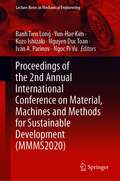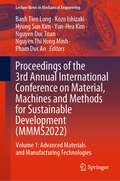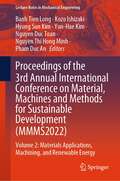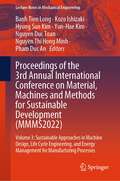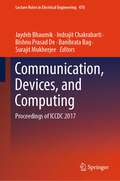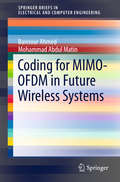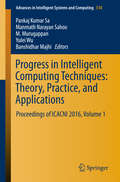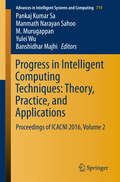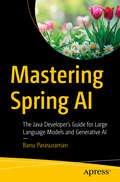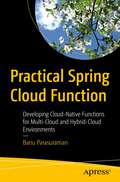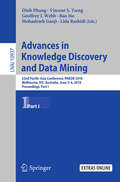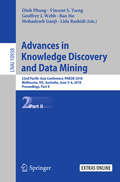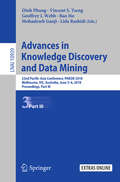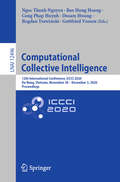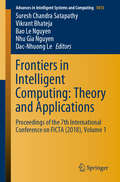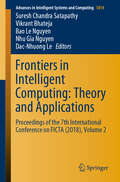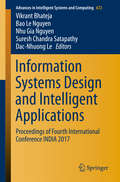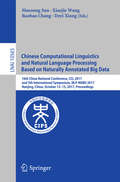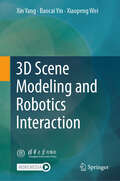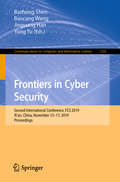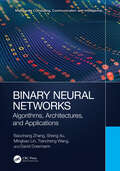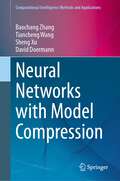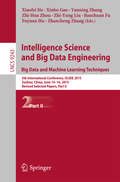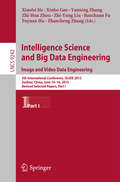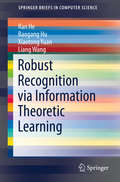- Table View
- List View
Proceedings of the 2nd Annual International Conference on Material, Machines and Methods for Sustainable Development (Lecture Notes in Mechanical Engineering)
by Ivan A. Parinov Ngoc Pi Vu Yun-Hae Kim Banh Tien Long Kozo Ishizaki Nguyen Duc ToanThis book presents selected, peer-reviewed proceedings of the 2nd International Conference on Material, Machines and Methods for Sustainable Development (MMMS2020), held in the city of Nha Trang, Vietnam, from 12 to 15 November, 2020. The purpose of the conference is to explore and ensure an understanding of the critical aspects contributing to sustainable development, especially materials, machines and methods. The contributions published in this book come from authors representing universities, research institutes and industrial companies, and reflect the results of a very broad spectrum of research, from micro- and nanoscale materials design and processing, to mechanical engineering technology in industry. Many of the contributions selected for these proceedings focus on materials modeling, eco-material processes and mechanical manufacturing.
Proceedings of the 3rd Annual International Conference on Material, Machines and Methods for Sustainable Development: Volume 1: Advanced Materials and Manufacturing Technologies (Lecture Notes in Mechanical Engineering)
by Banh Tien Long Kozo Ishizaki Nguyen Duc Toan Hyung Sun Kim Yun-Hea Kim Nguyen Thi Hong Minh Pham Duc AnThis book presents selected, peer-reviewed proceedings of the 3rd International Conference on Material, Machines and Methods for Sustainable Development (MMMS2022), held in the city of Can Tho, Vietnam, from 10 to 13 November 2022. The purpose of the conference is to explore and ensure an understanding of the critical aspects contributing to sustainable development with a focus on advanced mechanical engineering, automation, materials, machines and methods. The contributions published in this book come from authors representing universities, research institutes and industrial companies and reflect the results of a very broad spectrum of research, from micro- and nanoscale materials design and processing, to mechanical engineering technology in industry. Many of the contributions selected for these proceedings focus on materials modeling, eco-material processes and mechanical manufacturing.Volume 1 of this book focuses on topics dedicated to advanced materials and manufacturing technologies, ranging from synthesis of new materials to sustainable development manufacturing technology.
Proceedings of the 3rd Annual International Conference on Material, Machines and Methods for Sustainable Development: Volume 2: Materials Applications, Machining, and Renewable Energy (Lecture Notes in Mechanical Engineering)
by Yun-Hae Kim Banh Tien Long Kozo Ishizaki Nguyen Duc Toan Hyung Sun Kim Nguyen Thi Hong Minh Pham Duc AnThis book presents selected, peer-reviewed proceedings of the 3rd International Conference on Material, Machines and Methods for Sustainable Development (MMMS2022), held in the city of Can Tho, Vietnam, from 10 to 13 November 2022. The purpose of the conference is to explore and ensure an understanding of the critical aspects contributing to sustainable development with a focus on advanced mechanical engineering, automation, materials, machines and methods. The contributions published in this book come from authors representing universities, research institutes and industrial companies and reflect the results of a very broad spectrum of research, from micro- and nanoscale materials design and processing, to mechanical engineering technology in industry. Many of the contributions selected for these proceedings focus on materials modeling, eco-material processes and mechanical manufacturing. Volume 2 of this book focuses on topics dedicated to materials applications, machining, and renewable energy. Selected topics include: material machinability and economic efficiency, sustainable development manufacturing technology, environmental protection, as well as green development and climate change prevention.
Proceedings of the 3rd Annual International Conference on Material, Machines and Methods for Sustainable Development: Volume 3: Sustainable Approaches in Machine Design, Life Cycle Engineering, and Energy Management for Manufacturing Processes (Lecture Notes in Mechanical Engineering)
by Yun-Hae Kim Banh Tien Long Kozo Ishizaki Nguyen Duc Toan Hyung Sun Kim Nguyen Thi Hong Minh Pham Duc AnThis book presents selected, peer-reviewed proceedings of the 3rd International Conference on Material, Machines and Methods for Sustainable Development (MMMS2022), held in the city of Can Tho, Vietnam, from 10 to 13 November 2022. The purpose of the conference is to explore and ensure an understanding of the critical aspects contributing to sustainable development with a focus on advanced mechanical engineering, automation, materials, machines and methods. The contributions published in this book come from authors representing universities, research institutes and industrial companies and reflect the results of a very broad spectrum of research, from micro- and nanoscale materials design and processing, to mechanical engineering technology in industry. Many of the contributions selected for these proceedings focus on materials modeling, eco-material processes and mechanical manufacturing. Volume 3 of this book focuses on topics dedicated to sustainable approaches in machine design, life cycle engineering, and energy management for manufacturing processes.
Communication, Devices, and Computing: Proceedings of ICCDC 2017 (Lecture Notes in Electrical Engineering #470)
by Indrajit Chakrabarti Jaydeb Bhaumik Bishnu Prasad De Banibrata Bag Surajit MukherjeeThis book provides insights into the First International Conference on Communication, Devices and Computing (ICCDC 2017), which was held in Haldia, India on November 2–3, 2017. It covers new ideas, applications and the experiences of research engineers, scientists, industrialists, scholars and students from around the globe. The proceedings highlight cutting-edge research on communication, electronic devices and computing, and address diverse areas such as 5G communication, spread spectrum systems, wireless sensor networks, signal processing for secure communication, error control coding, printed antennas, analysis of wireless networks, antenna array systems, analog and digital signal processing for communication systems, frequency selective surfaces, radar communication, and substrate integrated waveguide and microwave passive components, which are key to state-of-the-art innovations in communication technologies.
Coding for MIMO-OFDM in Future Wireless Systems (SpringerBriefs in Electrical and Computer Engineering)
by Bannour Ahmed Mohammad Abdul MatinThis book introduces the reader to the MIMO-OFDM system, in Rayleigh frequency selective-channels. Orthogonal frequency division multiplexing (OFDM) has been adopted in the wireless local-area network standards IEEE 802. 11a due to its high spectral efficiency and ability to deal with frequency selective fading. The combination of OFDM with spectral efficient multiple antenna techniques makes the OFDM a good candidate to overcome the frequency selective problems.
Progress in Intelligent Computing Techniques: Theory, Practice, and Applications
by Pankaj Kumar Sa Manmath Narayan Sahoo M. Murugappan Yulei Wu Banshidhar MajhiThe book focuses on both theory and applications in the broad areas of communication technology, computer science and information security. This two volume book contains the Proceedings of 4th International Conference on Advanced Computing, Networking and Informatics. This book brings together academic scientists, professors, research scholars and students to share and disseminate information on knowledge and scientific research works related to computing, networking, and informatics to discuss the practical challenges encountered and the solutions adopted. The book also promotes translation of basic research into applied investigation and convert applied investigation into practice.
Progress in Intelligent Computing Techniques: Theory, Practice, and Applications
by Pankaj Kumar Sa Manmath Narayan Sahoo M. Murugappan Yulei Wu Banshidhar MajhiThe book focuses on both theory and applications in the broad areas of communication technology, computer science and information security. This two volume book contains the Proceedings of 4th International Conference on Advanced Computing, Networking and Informatics. This book brings together academic scientists, professors, research scholars and students to share and disseminate information on knowledge and scientific research works related to computing, networking, and informatics to discuss the practical challenges encountered and the solutions adopted. The book also promotes translation of basic research into applied investigation and convert applied investigation into practice.
Mastering Spring AI: The Java Developer’s Guide for Large Language Models and Generative AI
by Banu ParasuramanDive into the future of programming with this comprehensive guide for Java developers to integrate large language models (LLMs) and Generative AI using the Spring Framework. This book comes at a revolutionary time when AI technology is transforming how we implement solutions in various fields, including natural language processing, content generation, and predictive analytics. With its widespread use in the Java community, the Spring Framework is a logical choice for this integration. By focusing on integrating LLMs and GenAI with Spring, this book bridges a significant gap between cutting-edge AI technologies and traditional Java development practices. The author uses a hands-on approach, guiding you through practical implementation to effectively show how to apply theory in real-world situations. Basic introductions of topics—Spring AI, Spring Framework, and other related AI technologies—evolve into advanced integrations to ensure that you find valuable insights regardless of your starting level. Additionally, this book dedicates sections to security and ethical considerations, addressing the pressing issues associated with AI. With a look at emerging trends and future developments, this book prepares you for what's next, ensuring that you are not just catching up with the current state of technology but are also ready for future advancements. What You Will Learn • Master the integration of LLMs and GenAI with the Spring Framework • Develop practical skills in developing AI-driven applications using Java • Gain insights into handling data, security, and ethical considerations in AI applications • Apply strategies for optimizing performance and scalability in AI-enabled applications • Prepare for future AI trends and technologies Who This Book Is For Intermediate to advanced Java developers who are familiar with the Spring Framework, including concepts such as dependency injection, Spring Boot, and building RESTful services. This foundational knowledge will help developers grasp the more advanced topics of integrating AI technologies with Spring. Prior knowledge of basic AI concepts and machine learning is helpful but not essential as the book covers these topics from the ground up.
Practical Spring Cloud Function: Developing Cloud-Native Functions for Multi-Cloud and Hybrid-Cloud Environments
by Banu ParasuramanUnlike other resources that target only programming communities, this book targets both programming and business communities. With programming models shifting more towards no-code and low-code, citizen programmers from the business side will welcome this book as a guide for how to design and optimize their information pipeline while lowering costs for infrastructure. Programmers, on the other hand, will welcome this book's business-centric programming view, which will get them a step closer to fulfilling real business requirements. Practical Spring Cloud Function touches on the themes of portability, scalability, high performance and high availability. Each theme is explored via a real enterprise use case and code. The use cases target industries including energy (oil pipeline sensors), automotive (event-driven connected vehicles), and retail (conversational AI). After reading this book, you'll come away with the know-how to build and deploy cloud-native Java applications effectively and efficiently. What You Will LearnWrite functions and deploy to Amazon Web Services, Microsoft Azure, Google Cloud, IBM Cloud, and on-prem clouds such as VMWare Tanzu and RedHat OpenShiftSet up locally with KNative on Kubernetes, as well as on AWS, Azure, GCP, Tanzu, and othersBuild, test, and deploy a simple example with Spring Cloud FunctionDevelop an event-driven data pipeline with Spring Cloud FunctionIntegrate with AI and machine learning modelsApply Spring Cloud Function to the Internet of Things (IoT)Get industry-specific examples of Spring Cloud Function in actionWho This Book Is For Software and cloud-native application developers with prior programming experience in the cloud and/or Spring Framework. DevOps professionals may find this book beneficial as well.
Advances in Knowledge Discovery and Data Mining: 22nd Pacific-Asia Conference, PAKDD 2018, Melbourne, VIC, Australia, June 3-6, 2018, Proceedings, Part I (Lecture Notes in Computer Science #10937)
by Geoffrey I. Webb Vincent S. Tseng Dinh Phung Bao Ho Mohadeseh Ganji Lida RashidiThis three-volume set, LNAI 10937, 10938, and 10939, constitutes the thoroughly refereed proceedings of the 22nd Pacific-Asia Conference on Advances in Knowledge Discovery and Data Mining, PAKDD 2018, held in Melbourne, VIC, Australia, in June 2018. The 164 full papers were carefully reviewed and selected from 592 submissions. The volumes present papers focusing on new ideas, original research results and practical development experiences from all KDD related areas, including data mining, data warehousing, machine learning, artificial intelligence, databases, statistics, knowledge engineering, visualization, decision-making systems and the emerging applications.
Advances in Knowledge Discovery and Data Mining: 22nd Pacific-Asia Conference, PAKDD 2018, Melbourne, VIC, Australia, June 3-6, 2018, Proceedings, Part II (Lecture Notes in Computer Science #10938)
by Geoffrey I. Webb Vincent S. Tseng Dinh Phung Bao Ho Mohadeseh Ganji Lida RashidiThis three-volume set, LNAI 10937, 10938, and 10939, constitutes the thoroughly refereed proceedings of the 22nd Pacific-Asia Conference on Advances in Knowledge Discovery and Data Mining, PAKDD 2018, held in Melbourne, VIC, Australia, in June 2018. The 164 full papers were carefully reviewed and selected from 592 submissions. The volumes present papers focusing on new ideas, original research results and practical development experiences from all KDD related areas, including data mining, data warehousing, machine learning, artificial intelligence, databases, statistics, knowledge engineering, visualization, decision-making systems and the emerging applications.
Advances in Knowledge Discovery and Data Mining: 22nd Pacific-Asia Conference, PAKDD 2018, Melbourne, VIC, Australia, June 3-6, 2018, Proceedings, Part III (Lecture Notes in Computer Science #10939)
by Geoffrey I. Webb Vincent S. Tseng Dinh Phung Bao Ho Mohadeseh Ganji Lida RashidiThis three-volume set, LNAI 10937, 10938, and 10939, constitutes the thoroughly refereed proceedings of the 22nd Pacific-Asia Conference on Advances in Knowledge Discovery and Data Mining, PAKDD 2018, held in Melbourne, VIC, Australia, in June 2018. The 164 full papers were carefully reviewed and selected from 592 submissions. The volumes present papers focusing on new ideas, original research results and practical development experiences from all KDD related areas, including data mining, data warehousing, machine learning, artificial intelligence, databases, statistics, knowledge engineering, visualization, decision-making systems and the emerging applications.
Computational Collective Intelligence: 12th International Conference, ICCCI 2020, Da Nang, Vietnam, November 30 – December 3, 2020, Proceedings (Lecture Notes in Computer Science #12496)
by Ngoc Thanh Nguyen Gottfried Vossen Bogdan Trawiński Dosam Hwang Bao Hung Hoang Cong Phap HuynhThis volume constitutes the refereed proceedings of the 12th International Conference on Computational Collective Intelligence, ICCCI 2020, held in Da Nang, Vietnam, in November 2020.*The 70 full papers presented were carefully reviewed and selected from 314 submissions. The papers are grouped in topical sections on: knowledge engineering and semantic web; social networks and recommender systems; collective decision-making; applications of collective intelligence; data mining methods and applications; machine learning methods; deep learning and applications for industry 4.0; computer vision techniques; biosensors and biometric techniques; innovations in intelligent systems; natural language processing; low resource languages processing; computational collective intelligence and natural language processing; computational intelligence for multimedia understanding; and intelligent processing of multimedia in web systems. *The conference was held virtually due to the COVID-19 pandemic.
Frontiers in Intelligent Computing: Proceedings of the 7th International Conference on FICTA (2018), Volume 1 (Advances in Intelligent Systems and Computing #1013)
by Suresh Chandra Satapathy Vikrant Bhateja Bao Le Nguyen Nhu Gia Nguyen Dac-Nhuong LeThis book presents the proceedings of the 7th International Conference on Frontiers of Intelligent Computing: Theory and Applications (FICTA 2018), held at Duy Tan University, Da Nang, Vietnam. The event brought together researchers, scientists, engineers, and practitioners to exchange new ideas and experiences in the domain of intelligent computing theories with prospective applications in various engineering disciplines. These proceedings are divided into two volumes. Covering broad areas of information and decision sciences, with papers exploring both the theoretical and practical aspects of data-intensive computing, data mining, evolutionary computation, knowledge management and networks, sensor networks, signal processing, wireless networks, protocols and architectures, this volume is a valuable resource for postgraduate students in various engineering disciplines.
Frontiers in Intelligent Computing: Proceedings of the 7th International Conference on FICTA (2018), Volume 2 (Advances in Intelligent Systems and Computing #1014)
by Suresh Chandra Satapathy Vikrant Bhateja Bao Le Nguyen Nhu Gia Nguyen Dac-Nhuong LeThis book presents the proceedings of the 7th International Conference on Frontiers of Intelligent Computing: Theory and Applications (FICTA 2018), held at Duy Tan University, Da Nang, Vietnam. The event brought together researchers, scientists, engineers, and practitioners to exchange ideas and experiences in the domain of intelligent computing theories with prospective applications in various engineering disciplines. These proceedings are divided into two volumes. Covering broad areas of intelligent engineering informatics, with papers exploring both the theoretical and practical aspects of various areas like ANN and genetic algorithms, human–computer interaction, intelligent control optimization, intelligent e-learning systems, machine learning, mobile computing, and multi-agent systems, this volume is a valuable resource for postgraduate students in various engineering disciplines.
Information Systems Design and Intelligent Applications: Proceedings Of Fourth International Conference India 2017 (Advances In Intelligent Systems And Computing #672)
by Suresh Chandra Satapathy Vikrant Bhateja Bao Le Nguyen Nhu Gia Nguyen Dac-Nhuong LeThe book is a collection of high-quality peer-reviewed research papers presented at International Conference on Information System Design and Intelligent Applications (INDIA 2017) held at Duy Tan University, Da Nang, Vietnam during 15-17 June 2017. The book covers a wide range of topics of computer science and information technology discipline ranging from image processing, database application, data mining, grid and cloud computing, bioinformatics and many others. The various intelligent tools like swarm intelligence, artificial intelligence, evolutionary algorithms, bio-inspired algorithms have been well applied in different domains for solving various challenging problems.
Chinese Computational Linguistics and Natural Language Processing Based on Naturally Annotated Big Data: 16th China National Conference, CCL 2017, and 5th International Symposium, NLP-NABD 2017, Nanjing, China, October 13-15, 2017, Proceedings (Lecture Notes in Computer Science #10565)
by Deyi Xiong Maosong Sun Xiaojie Wang Baobao ChangThis book constitutes the proceedings of the 15th China National Conference on Computational Linguistics, CCL 2016, and the 4th International Symposium on Natural Language Processing Based on Naturally Annotated Big Data, NLP-NABD 2016, held in Yantai City, China, in October 2016. The 29 full papers and 8 short papers presented in this volume were carefully reviewed and selected from 85 submissions. They were organized in topical sections named: semantics; machine translation; multilinguality in NLP; knowledge graph and information extraction; linguistic resource annotation and evaluation; information retrieval and question answering; text classification and summarization; social computing and sentiment analysis; and NLP applications.
3D Scene Modeling and Robotics Interaction
by Xin Yang Baocai Yin Xiaopeng WeiThis book focuses on the intelligent perception and interaction module in intelligent robotic systems, establishes a multidisciplinary cross-fertilization knowledge system, explores the related technology frontiers and research frontiers as comprehensively as possible from the perspective of scene modeling and understanding, and develops a practical exposition of practical application tasks such as robotic navigation, obstacle avoidance, and grasping. The main contents of this book include 3D reconstruction, scene exploration, scene understanding, robot navigation and obstacle avoidance, robot grasping and comprehensive project practice. Combining theory and practice, the book contains both basic algorithms and covers the latest technologies with detailed code or pseudo-code resources. This book can be used as a teaching reference book for information and intelligence related majors in higher education institutions, computer graphics, computer vision and intelligent robotics and other related fields, as well as a reference book for technicians engaged in related fields. This book takes intelligent robots as the carrier, focuses on the technologies of environment perception and understanding and applying them to practical tasks such as robot navigation, obstacle avoidance and grasping. The book consists of six chapters. Chapters 1 to 3 provide a comprehensive introduction to the development and application of scene modeling and understanding technologies, including 3D reconstruction, scene exploration, and scene understanding. Chapters 4 and Chapter 5 provide a comprehensive introduction to the development and application of robot perception technologies, including visual relocalization and robot navigation, obstacle avoidance and grasping. Chapter 6 introduces comprehensive project practice with 3D scene modeling and understanding for robot tasks as an example, which facilitates readers to have a comprehensive understanding and mastery of theory and practice. The translation was done with the help of artificial intelligence. A subsequent human revision was done primarily in terms of content.
Frontiers in Cyber Security: Second International Conference, FCS 2019, Xi'an, China, November 15–17, 2019, Proceedings (Communications in Computer and Information Science #1105)
by Yong Yu Jinguang Han Bazhong Shen Baocang WangThis book constitutes the proceedings of the Second International Conference on Frontiers in Cyber Security, FCS 2019, held in Xi'an, China, in November 2019. The 20 full papers along with the 2 short papers presented were carefully reviewed and selected from 67 submissions. The papers are organized in topical sections on: symmetric key cryptography; public key cryptography; post-quantum cryptography: signature; attack and behavior detection; authenticated key agreement; blockchain; system and network security.
Binary Neural Networks: Algorithms, Architectures, and Applications (Multimedia Computing, Communication and Intelligence)
by David Doermann Sheng Xu Baochang Zhang Mingbao Lin Tiancheng WangDeep learning has achieved impressive results in image classification, computer vision, and natural language processing. To achieve better performance, deeper and wider networks have been designed, which increase the demand for computational resources. The number of floatingpoint operations (FLOPs) has increased dramatically with larger networks, and this has become an obstacle for convolutional neural networks (CNNs) being developed for mobile and embedded devices. In this context, Binary Neural Networks: Algorithms, Architectures, and Applications will focus on CNN compression and acceleration, which are important for the research community. We will describe numerous methods, including parameter quantization, network pruning, low-rank decomposition, and knowledge distillation. More recently, to reduce the burden of handcrafted architecture design, neural architecture search (NAS) has been used to automatically build neural networks by searching over a vast architecture space. Our book will also introduce NAS and binary NAS and its superiority and state-of-the-art performance in various applications, such as image classification and object detection. We also describe extensive applications of compressed deep models on image classification, speech recognition, object detection, and tracking. These topics can help researchers better understand the usefulness and the potential of network compression on practical applications. Moreover, interested readers should have basic knowledge of machine learning and deep learning to better understand the methods described in this book. Key Features • Reviews recent advances in CNN compression and acceleration • Elaborates recent advances on binary neural network (BNN) technologies • Introduces applications of BNN in image classification, speech recognition, object detection, and more Baochang Zhang is a full professor with the Institute of Artificial Intelligence, Beihang University, Beijing, China. He was selected by the Program for New Century Excellent Talents in the University of Ministry of Education of China, chosen as the Academic Advisor of the Deep Learning Lab of Baidu Inc., and was honored as a Distinguished Researcher of Beihang Hangzhou Institute in Zhejiang Province. His research interests include explainable deep learning, computer vision, and pattern recognition. His HGPP and LDP methods were state-of-the-art feature descriptors, with 1234 and 768 Google Scholar citations, respectively, and both “Test-of-Time” works. His team’s 1-bit methods achieved the best performance on ImageNet. His group also won the ECCV 2020 Tiny Object Detection, COCO Object Detection, and ICPR 2020 Pollen recognition challenges. Sheng Xu received a BE in automotive engineering from Beihang University, Beijing, China. He has a PhD and is currently at the School of Automation Science and Electrical Engineering, Beihang University, specializing in computer vision, model quantization, and compression. He has made significant contributions to the field and has published about a dozen papers as the first author in top-tier conferences and journals such as CVPR, ECCV, NeurIPS, AAAI, BMVC, IJCV, and ACM TOMM. Notably, he has 4 papers selected as oral or highlighted presentations by these prestigious conferences. Furthermore, Dr. Xu actively participates in the academic community as a reviewer for various international journals and conferences, including CVPR, ICCV, ECCV, NeurIPS, ICML, and IEEE TCSVT. His expertise has also led to his group’s victory in the ECCV 2020 Tiny Object Detection Challenge. Mingbao Lin finished his MS-PhD study and obtained a PhD in intelligence science and technology from Xiamen University, Xiamen, China in 2022. In 2016, he received a BS from Fuzhou University, Fuzhou, China. He is currently a senior researcher with the Tencent Youtu Lab, Shanghai, China. His publications on top-tier conferences/journals include: IEEE TP
Neural Networks with Model Compression (Computational Intelligence Methods and Applications)
by David Doermann Sheng Xu Baochang Zhang Tiancheng WangDeep learning has achieved impressive results in image classification, computer vision and natural language processing. To achieve better performance, deeper and wider networks have been designed, which increase the demand for computational resources. The number of floating-point operations (FLOPs) has increased dramatically with larger networks, and this has become an obstacle for convolutional neural networks (CNNs) being developed for mobile and embedded devices. In this context, our book will focus on CNN compression and acceleration, which are important for the research community. We will describe numerous methods, including parameter quantization, network pruning, low-rank decomposition and knowledge distillation. More recently, to reduce the burden of handcrafted architecture design, neural architecture search (NAS) has been used to automatically build neural networks by searching over a vast architecture space. Our book will also introduce NAS due to its superiority and state-of-the-art performance in various applications, such as image classification and object detection. We also describe extensive applications of compressed deep models on image classification, speech recognition, object detection and tracking. These topics can help researchers better understand the usefulness and the potential of network compression on practical applications. Moreover, interested readers should have basic knowledge about machine learning and deep learning to better understand the methods described in this book.
Intelligence Science and Big Data Engineering. Big Data and Machine Learning Techniques
by Zhi-Hua Zhou Xiaofei He Xinbo Gao Yanning Zhang Zhi-Yong Liu Baochuan Fu Fuyuan Hu Zhancheng ZhangThe two-volume set LNCS 9242 + 9243 constitutes the proceedings of the 5th International Conference on Intelligence Science and Big Data Engineering, IScIDE 2015, held in Suzhou, China, in June 2015. The total of 126 papers presented in the proceedings was carefully reviewed and selected from 416 submissions. They deal with big data, neural networks, image processing, computer vision, pattern recognition and graphics, object detection, dimensionality reduction and manifold learning, unsupervised learning and clustering, anomaly detection, semi-supervised learning.
Intelligence Science and Big Data Engineering. Image and Video Data Engineering
by Zhi-Hua Zhou Xiaofei He Xinbo Gao Yanning Zhang Zhi-Yong Liu Baochuan Fu Fuyuan Hu Zhancheng ZhangThe two-volume set LNCS 9242 + 9243 constitutes the proceedings of the 5th International Conference on Intelligence Science and Big Data Engineering, IScIDE 2015, held in Suzhou, China, in June 2015. The total of 126 papers presented in the proceedings was carefully reviewed and selected from 416 submissions. They deal with big data, neural networks, image processing, computer vision, pattern recognition and graphics, object detection, dimensionality reduction and manifold learning, unsupervised learning and clustering, anomaly detection, semi-supervised learning.
Robust Recognition via Information Theoretic Learning
by Liang Wang Ran He Baogang Hu Xiaotong YuanThis Springer Brief represents a comprehensive review of information theoretic methods for robust recognition. A variety of information theoretic methods have been proffered in the past decade, in a large variety of computer vision applications; this work brings them together, attempts to impart the theory, optimization and usage of information entropy. The authors resort to a new information theoretic concept, correntropy, as a robust measure and apply it to solve robust face recognition and object recognition problems. For computational efficiency, the brief introduces the additive and multiplicative forms of half-quadratic optimization to efficiently minimize entropy problems and a two-stage sparse presentation framework for large scale recognition problems. It also describes the strengths and deficiencies of different robust measures in solving robust recognition problems.
